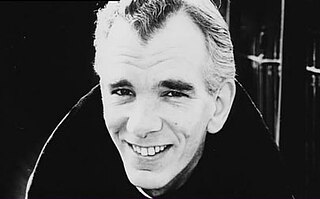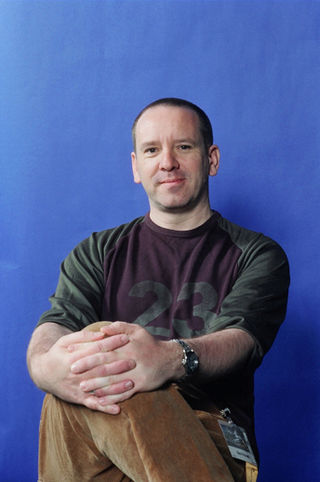Related Research Articles

Shada is a story from the British science fiction television series Doctor Who. Written by the series' script editor Douglas Adams, it was intended as the final serial of the 1979–80 season but was never originally completed, owing to strike action at the BBC during studio recording. Entering production as a six-part story in 1979, plans were later revised for the story to be broadcast as a four-part story in 1980. Ultimately however, the story was never completed in either format.
City of Death is the second serial of the seventeenth season of the British science fiction television series Doctor Who, which depicts the adventures of a time-travelling humanoid alien known as the Doctor. It was produced by the BBC and first broadcast in four weekly parts between 29 September 1979 and 20 October 1979 on BBC1. The serial was written by "David Agnew" – a pseudonym for the combined work of David Fisher, Douglas Adams, and Graham Williams – and directed by Michael Hayes.

Romana, short for Romanadvoratrelundar, is a fictional character in the long-running British science fiction television series Doctor Who. A Time Lord from the planet Gallifrey, she is a companion to the Fourth Doctor.

David Arthur Whitaker was an English television writer and novelist who worked on the early years of the science-fiction TV series Doctor Who. He served as the programme's first story editor, supervising the writing of its first 51 episodes from 1963 to 1964.
Remembrance of the Daleks is the first serial of the 25th season of the British science fiction television series Doctor Who. The serial was first broadcast in four weekly episodes from 5 to 26 October 1988. It was written by Ben Aaronovitch and directed by Andrew Morgan.
Planet of the Daleks is the fourth serial of the tenth season of the British science fiction television series Doctor Who, which was first broadcast in six weekly parts on BBC1 from 7 April to 12 May 1973.
The Evil of the Daleks is the mostly-missing ninth and final serial of the fourth season in the British science fiction television series Doctor Who, which originally aired in seven weekly parts from 20 May to 1 July 1967.
Day of the Daleks is the first serial of the ninth season of the British science fiction television series Doctor Who, which was first broadcast in four weekly parts from 1 to 22 January 1972. It was the first of four Third Doctor serials to feature the Daleks, which returned to the series for the first time since The Evil of the Daleks (1967).
Doctor Who spin-offs refers to material created outside of, but related to, the long-running British science fiction television series Doctor Who.
Terrance William Dicks was an English author and television screenwriter, script editor and producer. In television, he had a long association with the BBC science-fiction series Doctor Who, working as a writer and also serving as the programme's script editor from 1968 to 1974. The Doctor Who News Page described him as "arguably the most prolific contributor to Doctor Who". He later became a script editor and producer of classic serials for the BBC.
Lance Parkin is a British author. He is best known for writing fiction and reference books for television series, in particular Doctor Who and as a storyliner on Emmerdale.

Gary Russell is a British freelance writer, producer and former child actor. As a writer, he is best known for his work in connection with the television series Doctor Who and its spin-offs in other media. As an actor, he is best known for playing Dick Kirrin in the British 1978 television series The Famous Five.
Resurrection of the Daleks is the fourth serial of the 21st season in the British science fiction television series Doctor Who, which was first broadcast in two weekly parts on BBC1 between 8 February and 15 February 1984. The serial was intended to be transmitted as four 23-minute episodes but a late scheduling change by the BBC meant that it was transmitted as two episodes of 46 minutes; reruns restored it to its intended format.
Revelation of the Daleks is the sixth and final serial of the 22nd season in the British science fiction television series Doctor Who, which was first broadcast in two weekly parts on 23 and 30 March 1985. This was the final serial to be broadcast in 45-minute episodes; this format would return 20 years later when the series resumed in 2005. Revelation of the Daleks is the only time the Sixth Doctor encountered the Daleks in a television story.
Black Orchid is the fifth serial of the 19th season of the British science fiction television series Doctor Who, which was first broadcast on BBC1 on 1 and 2 March 1982.
The Power of the Daleks is the completely missing third serial of the fourth season of British science fiction television series Doctor Who, which was first broadcast in six weekly parts from 5 November to 10 December 1966. It is the first full story to feature Patrick Troughton as the Second Doctor.
The Past Doctor Adventures were a series of spin-off novels based on the long running BBC science fiction television series Doctor Who and published under the BBC Books imprint. For most of their existence, they were published side-by-side with the Eighth Doctor Adventures. The novels regularly featured the First through Seventh Doctors. The Infinity Doctors had an ambiguous place in continuity and featured an unidentified incarnation of the Doctor. The Eighth Doctor co-starred with the Fourth Doctor in one novel (Wolfsbane) and, after the Eighth Doctor Adventures had ceased publication, a novel featuring the Eighth Doctor and set between two earlier Eighth Doctor Adventures was published within the Past Doctor series.
Martin Day is a screenwriter and novelist best known for his work on various spin-offs related to the BBC Television series Doctor Who, and many episodes of the soaps Fair City, Doctors and Family Affairs. Having worked previously at Bath Spa University, he is now visiting lecturer in creative writing at the University of Winchester and the Wessex regional representative of the Writers' Guild of Great Britain.
"The Shakespeare Code" is the second episode of the third series of the revived British science fiction television series Doctor Who. It was broadcast on BBC One on 7 April 2007. According to the BARB figures this episode was seen by 7.23 million viewers and was the fifth most popular broadcast on British television in that week. Originally titled "Love's Labour's Won", was also titled by David Tennant as "Theatre of Doom" during the "David's Video Diaries 2", part of the Series 3 DVD, the episode was re-titled as a reference to The Da Vinci Code.
References
- ↑ "BBC - Doctor Who Classic Episode Guide - The Keys of Marinus - Details". BBC. Archived from the original on 27 December 2019. Retrieved 20 December 2019.
- ↑ "BBC - Cult - Doctor Who - DVD - Pyramids of Mars". Archived from the original on 20 August 2016. Retrieved 24 December 2015.
- ↑ "BBC - Doctor Who - the Series at a Glance - News & Features". Archived from the original on 13 November 2010. Retrieved 20 December 2019.
- ↑ Chris Allen (10 June 2010). "Gareth Roberts talks 'Who', 'Sarah Jane'". Digital Spy. Archived from the original on 25 September 2015. Retrieved 24 December 2015.
- ↑ Doctor Who: Shada: Amazon.co.uk: Douglas Adams, Gareth Roberts: 9781849903271: Books. ASIN 1849903271.
- ↑ Higson, Charlie. "Sad day today as ITV announce they don't want any more #JekyllandHyde Ah well, I tried. It was a grand adventure while it lasted". Archived from the original on 20 October 2021. Retrieved 5 May 2018.
- ↑ Able, Sane and. "Gareth Roberts". Archived from the original on 5 June 2019. Retrieved 5 June 2019.
- ↑ Preddle, Jon (June 1997). "Gary Russell: From Peladon to Placebos". Time Space Visualiser. No. 51. The New Zealand Doctor Who Fan Club. Archived from the original on 8 February 2021. Retrieved 20 August 2020.
I've just done my first non-fiction book, Oh No It's A Completely Unofficial Simpsons Guide for Virgin, co-authored with Gareth Roberts which has, to be frank, been more of a nightmare than it needed to be [the book was published as I Can't Believe It's An Unofficial Simpsons Guide, with Gary and Gareth writing under the pseudonyms Warren Martyn & Adrian Wood].
- ↑ "BBC - Cult - The Simpsons - Episode Guide Homepage". BBC Online . BBC. Archived from the original on 5 January 2005. Retrieved 20 August 2020.
The information in this section comes from 'I Can't Believe It's a Bigger and Better Updated Unofficial Simpsons Guide' by Warren Martyn and Adrian Wood, published by Virgin Books.
- ↑ Jusino, Teresa (5 September 2017). "Doctor Who Writer Gareth Roberts Talks Vile, Ignorant Trash About Trans Women". The Mary Sue. Archived from the original on 1 March 2019. Retrieved 28 February 2019.
- ↑ Farrow, Max (4 September 2017). "'Doctor Who' Writer Gareth Roberts Tweets Controversial Comments Online". geeks.media. Archived from the original on 1 March 2019. Retrieved 28 February 2019.
- 1 2 "Doctor Who writer Tweeted a transphobic comment and the internet is not having it". Gay Star News. 17 September 2017. Archived from the original on 13 December 2018. Retrieved 28 February 2019.
- ↑ Flood, Alison (5 June 2019). "Doctor Who anthology drops writer over transgender remarks". The Guardian. Archived from the original on 5 June 2019. Retrieved 5 June 2019.
- ↑ Roberts, Gareth (4 June 2019). "Statement on BBC Books and Transgenderism". Medium. Archived from the original on 4 June 2019. Retrieved 7 September 2022.
- ↑ "There's nothing 'homophobic' about the word 'homosexual'". www.spiked-online.com. Archived from the original on 6 September 2023. Retrieved 6 September 2023.